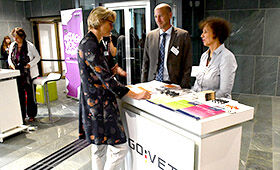Budget debate 2019—investments in education and research
Future technologies, financing of training and higher education study, the Digital Pact for Schools, investment in universities of applied sciences: Minister Karliczek addressed these four main areas of education and research policy during her speech on the 2019 Budget Law. She announced major changes for vocational education and training.

Federal Minister of Education and Research Anja Karliczek stated that accomplishing the tasks facing education and research policy in 2019 required courage and confidence. Speaking in the Bundestag (federal parliament) in November 2018 during a debate on the 2019 budget, she explained plans for how an allocation of €18 billion is to be invested. Good education and excellent research are supposed to ensure Germany’s future viability.
Appreciation of trainees and students
Minister Karliczek placed a particular emphasis on societal recognition of vocational education and training. Following a rise in funding rates for training in 2019, a minimum training allowance is scheduled to be introduced for the first time 2020. This will be based on the grants system for pupils in upper and post-secondary education. The amount payable in the first year of training will be €504. Previously, the Vocational Training Act merely stipulated that an “appropriate allowance” should be paid. A further measure involves a plan to introduce standardised titles for advanced vocational education and training qualifications. Until now, there have been a multitude of different names in place, such as service technician, process manager or certified senior clerk. The BMBF now intends to use the uniform titles of vocational specialist, vocational bachelor’s, and vocational master’s in order to achieve better comparability and visibility for vocational education and training. The reformed Vocational Training Act, which is scheduled to enter into force in 2020, will form the basis for these amendments.
The Digital Pact for Schools represents a further planned investment. The €720 million which have been earmarked for digital equipment at schools, including vocational schools, are currently the subject of political debate. German Basic Law would need to be amended in order to implement the plan, and this is meeting with resistance from some individual federal states. Ms. Karliczek called upon the states to agree to the amendment.
Investments in research
The universities of applied sciences are an example of successful cooperation between the Federal Government and the federal states, and the minister paid tribute to this: “We are working together on the further development of the German research and higher education system.” €430 million will be made available to the universities of applied sciences over the next eight years in order to fund research and create more professorships. In November, the Federal Government and the federal states concluded three further agreements relating to cooperation in the field of the universities of applied sciences. On this basis, Minister Karliczek expressed a hope that the federal states will also commit to the Higher Education Pact, the Pact for Research and Innovation, and the Teaching Quality Pact.
Investment in future technologies formed a further central point of the minister’s address. She made particular mention of funding for research into artificial intelligence (AI). The Federal Government is seeking to invest €3 billion in this area by 2025. The intention is that this funding should be used for purposes such as the establishment of 100 new AI professorships and in order to strengthen and network research. The new Agency for Disruptive Innovation, which the minister also announced in her speech, shows just how important such developments are for Germany’s future viability. The agency will represent a significant building block in the area of research into and utilisation of artificial intelligence. The intention also is that it will foster innovations in other fields including new forms of mobility and medical technology.